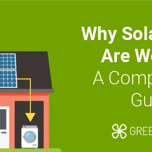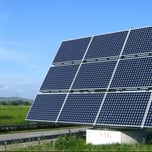Answer these simple questions and we will find you the BEST prices
Which type of solar quotes do you need?
It only takes 30 seconds
100% free with no obligation

Get up to 4 quotes by filling in only 1 quick form

Slash your energy bills by installing solar panels

For the average 2-3 bedroom house
- GreenMatch
- Solar Energy
- Solar System
- 10kW Solar System
10kW Solar System UK: Costs & Savings (October 2025)

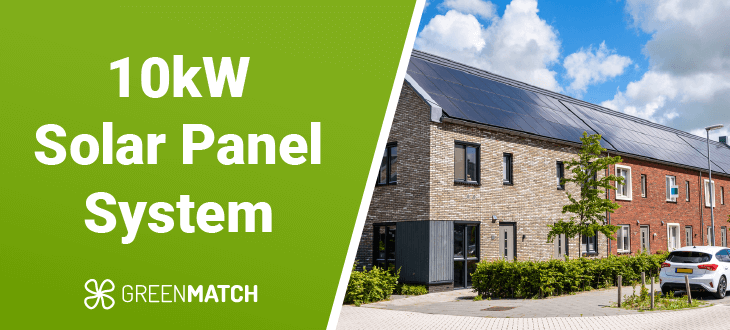
- A 10kW solar panel system in the UK typically costs £12,300 - £15,000 and can save you up to £2,082.50 annually.
- A 10kW solar system can last 25 - 30 years, and you could break even after about 5 years. The savings after 30 years are estimated at between £42,000 - £52,000.
- 10kW solar systems are well-suited for larger homes housing 6 or more people.
A 10kW solar system in the UK can generate electricity for large homes or smaller businesses. Large homes can benefit significantly in energy savings from having solar panels. This is because they can help offset the higher energy demands of larger homes compared to smaller ones.
To save money on your new solar system, we highly recommend comparing solar panel quotes from multiple installers. You can also avoid spending hours researching for them by filling out our simple 30-second form. We’ll connect you with qualified installers who will send you up to 4 free quotes so you can find the best possible price.
Click the button below to start comparing free quotes with no obligations.
- Quotes from local engineers
- Payment by finance available
- Save up to £1,567 per year
It only takes 30 seconds



10kW solar system costs in the UK in 2025
In 2025, the average 10kW solar system cost in the UK is between £12,300 - £15,000. This price includes the supply of the 10kW solar panel equipment, installing and connecting to the electricity supply, and VAT (zero-rated). If you'd like to store a portion of the electricity you generate, you'll have to take the solar battery price into account.
For optimal storage, a 20 - 30kWh battery is recommended. However, the total cost of a 10kW solar system with battery storage can range from £16,000 to £23,500. Total costs will depend on the make and model you choose. We’ve outlined some estimated price ranges below:
| System Element | Average Price Range |
|---|---|
| Solar panel system (10kW) | £8,000 - £9,000 |
| Installation | £2,000 |
| Solar battery (20 - 30kWh) optional | £6,000 - £12,500 |
| Totals (with battery) | £16,000 - £23,500 |
Estimate potential solar panel costs and savings based on your location using our solar calculator.
10kW solar system grants in 2024
There are currently several ways you can get government support to help fund the installation of solar panels. Most notable are the ECO4 and Smart Export Guarantee (SEG). The ECO4 (Energy Company Obligation), is a scheme in which large energy suppliers in the UK help lower-income households install energy efficiency upgrades (including solar panels) for free.
The Smart Export Guarantee, is an alternative way to fund solar installation, as it acts as a pay-back scheme. For those generating more solar energy than they use, it can be sent back into the grid in exchange for payment. In this way, homeowners can recoup their investment more quickly.
Solar panel grants do come with eligibility criteria, but it is worth exploring if you might be suitable, as they can significantly reduce the financial strain of installing solar panels. We’ve listed all available solar grants below as an overview:
| Solar Panel Grants | ||
|---|---|---|
| Name of Grant | Savings Potential | Eligibility |
| Energy Company Obligation (ECO4) | Partial payment or entirely free solar panel installation | Households of low-income, fuel-poor or receiving benefits |
| Smart Export Guarantee (SEG) | Earn between 5 and 30p for each kWh sent to the grid. Between £500 - £1,000 savings annually | Any UK home solar panel owner |
| 0% VAT | Until March 2027, solar panels are subject to 0% VAT relief - meaning you pay 20% less | Any UK buyers will benefit |
| Home Upgrade Grant (HUG2) | Grant applicants could receive up to £10,000 | Low-income homes, with an energy certificate between D and G |
| Warm Homes Nest Scheme (Wales Only) | Potential for free solar panel installation | Welsh residents with poor energy efficiency, receiving benefits or living with a health condition |
10kW solar system savings in the UK
A 10kW solar system has the potential to save you a significant amount of money every year and eventually generate a profit. We estimate that you can save as much as £2,082 a year using solar panels. We've broken down the potential savings and returns that can be made on this system in the table below.
| Savings on 10kW Solar System | |||
|---|---|---|---|
| Cost | Annual Savings | Break Even Point | Savings After 25 - 30 Years |
| £12,300 - £15,000 | £2,082.50 | 5 years | £42,000 - £52,000 |
Whilst these savings are significant, especially when considering solar panels can operate efficiently for about 25 - 30 years, you can also enjoy additional savings through the Smart Export Guarantee (SEG). You could earn between £500 - £1,000 annually, sending excess electricity to the National Grid.
A 10kW solar photovoltaic system is more than enough to run most houses. In fact, I am writing to you on a computer that is plugged into such a house. The PV system was designed for a large family and to meet their annual loads. As most families are smaller today, a substantially smaller system (e.g., 5kW) would be more appropriate for most families if only electrical loads are considered.

Joshua M. Pearce is the John M. Thompson Chair in Information Technology and Innovation. He holds appointments at Ivey Business School and the Department of Electrical & Computer Engineering at Western University. He runs the Free Appropriate Sustainability Technology research group.
Pros and cons of a 10kW solar system
Similar to all home improvement and domestic energy systems, there are pros and cons. A 10kW solar panel system is a rather large system, so there's a lot to consider, such as cost, space, environmental footprint, maintenance, solar panel efficiency, and more.
Many homeowners across the UK agree the advantages outweigh any disadvantages – as seen in the increasing number of new solar panel installations every year. But don't just take our word for it – In this section, we'll objectively weigh up the pros and cons so you can make the decision yourself.
Advantages of a 10kW solar system
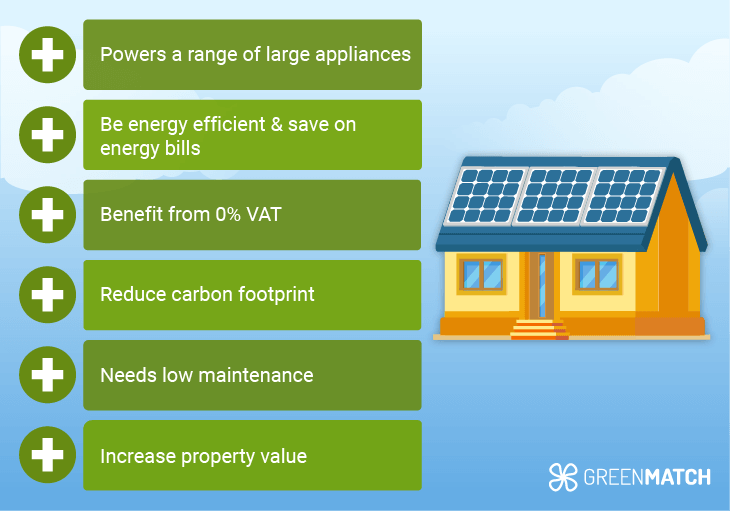
1. 10kW solar systems can power a range of large appliances.
A 10kW solar panel system is ideal for large homes with 6 or more bedrooms and even small businesses. This is because it can power a wide range of appliances.
For example, this system can power lighting, refrigerators, and washing machines, to larger appliances like electric vehicle chargers, air conditioning, and even a heat pump. Smaller solar panel systems may struggle to power these large appliances comfortably.
The exact number of appliances and devices that a 10kW solar system can power will depend on several factors, such as the appliances' efficiency, the amount of sunlight the solar panels receive, and the time of year.
2. Become more energy independent and save on annual energy bills.
In recent years, we've seen how easily energy prices can fluctuate. By switching to a 10kW solar system, we estimate you can save as much as £2,082 a year on electricity costs alone. This means you could break even on your investment in as little as 5 years, with savings in the region of £42,000 - £52,000 after 25 - 30 years.
That annual savings figure doesn't even include the money you could earn from exporting electricity back to the National Grid, through the Smart Export Guarantee (SEG). This is all because you're generating electricity at no cost from a renewable energy source: the sun. Not only can this benefit you financially, but it also gives you greater energy independence.
3. Benefit from 0% VAT on energy-saving products.
To encourage the uptake of renewable energy and low-carbon systems, the UK Government has introduced a VAT reduction. That means, until March 2027, you will pay 0% VAT for the supply and installation of any domestic solar PV system in the UK. A typical family installing rooftop solar panels will save more than £2,000 on installation. This cost reduction will happen automatically when you install through an MCS-certified installer.
4. Reduce your home's carbon footprint.
It's a common misconception that electricity from the grid is always environmentally friendlier than gas, but that's not always the case. However, by generating your own electricity via solar panels, you can ensure you're generating clean, renewable electricity. We estimate you'd save as much as 3,600 kilograms of CO2 from entering the atmosphere by switching to solar energy. That's equivalent to the carbon emissions of driving 14,800 kilometres (9,200 miles)!
5. 10kW solar systems need low maintenance.
Even with a large solar system, maintenance is minimal, requiring only regular panel cleaning and yearly inspections. Although larger systems involve more panels to monitor, the added maintenance is not proportional, making it a practical choice.
6. Solar panels increase property value.
Studies by Solar Energy UK and Zillow found that solar panels can increase your property value from 2% - 6%, respectively - adding between £866 to £4,787, depending on your location.
With increased property value from solar panels, you benefit from a higher resale value, a competitive advantage when selling, and improved equity for loans, mortgages and other financial purposes.
Disadvantages of a 10kW solar system
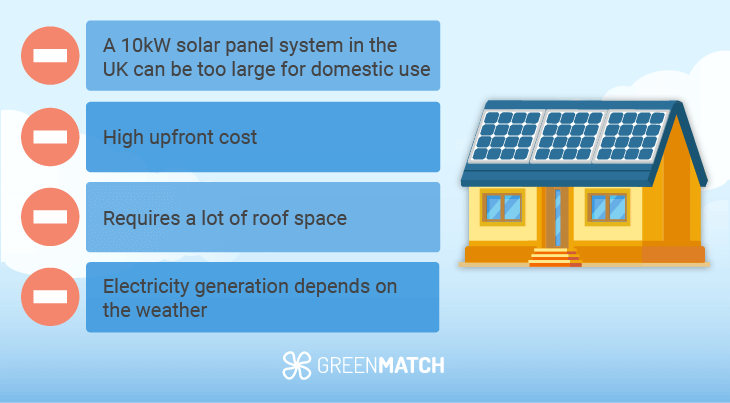
1. A 10kW solar panel system in the UK can be too large for domestic use.
Depending on how much electricity your household uses on a daily and annual basis, solar panels in a 10kW system may be too large. Even if you store the excess electricity in a battery or export the excess electricity back to the grid, you'll still need to invest in this large domestic system.
It's important to get the correctly sized solar system for your home. Too small and you won't be able to generate enough electricity. Too large and you'll be overpaying for a system that will take longer to pay itself off.
Read more about finding out how big of a solar system you need in our guide.
Don't think a 10kW solar system is the right size for you? Check out our other guides:
- 2kW solar systems
- 3kW solar systems
- 4kW solar systems
- 5kW solar systems
- 6kW solar systems
- 12kW solar systems
2. High upfront cost.
We've mentioned earlier that a 10kW solar system will cost between £12,300 - £15,000 on average. Whilst this can seem like a high upfront cost, this solar system investment has a break-even point of just 5 years, with average savings after 25-30 years of between £42,000 - £52,000. This can make the upfront costs much more manageable when viewed long-term.
If you're also considering the cost of a 10kW solar system with battery storage, you should note that prices will vary depending on the battery you choose. What size battery for solar panels you might need can vary based on your household energy consumption.
The cost of solar batteries like the Tesla Powerwall price is something to consider. For more comprehensive prices, you can check our dedicated pages with reviews of the best solar battery systems.
While you get more value for your money by choosing a larger solar system, it will require a larger initial investment upfront before the solar panel system begins to pay for itself. The good news is there are ways to help offset the cost. One of the best ways is to look into grants for solar panels and generation pay-back schemes, like the Smart Export Guarantee (SEG).
3. Requires a lot of roof space.
A common question from homeowners that we answer is "How many solar panels are in a 10kW solar system?". While it depends on the size of each solar panel, you can expect anywhere between 25 and 40 panels.
That translates to needing between 47m2 and 76m2 of roof space. It's common that the average family's home won't have the required roof space, so it's important to review your building plans and consult a solar installer first.
4. Electricity generation depends on the weather.
The electricity you probably get right now from the National Grid comes reliably and whenever you need it. Generating your own electricity via solar panels is a bit different because you rely on sunlight that only comes during the day. The amount of sunlight your panels receive can change significantly depending on the day/season, which means it is possible to not generate enough electricity to meet your demand.
To solve this, you can add a solar battery storage system. A battery will store the energy you generate to be used later, including on a cloudy day or during a power outage.
Solar panels for a 10kW system aren't a fit for all households, but luckily there are different kilowatt system size options to choose from. A professional solar installer is your best bet for navigating these options and installing them. A professional can offer advice specific to your home and can take you through both the solar panel installation and testing steps. Not only that, but you'll receive a tailored quote, so you have full clarity when it comes to the cost.
It's a smart move to compare multiple quotes because it gives you a clear picture of what's available in the market and you can find the best deal that fits your budget. With GreenMatch, you easily get up to 4 comparison quotes with none of the hassle of checking credentials. You can rest assured that all of the quotes you receive are from qualified installers.
Click the button below to start getting free, no-obligation comparison quotes. It's the best way to make sure you get the solar solution that's just right for your home.
- Quotes from local engineers
- Payment by finance available
- Save up to £1,567 per year
It only takes 30 seconds



How much does a 10kW solar system produce?
On an average day in the UK with 4.4 hours of sunlight (based on national data), you can expect your 10kW solar panel system to generate a total of 44kWh. Based on the typical daily electricity use of a home in the UK, this is above average.
For reference, a home with 4 to 5 people typically uses 11.2kWh of electricity daily. That means a 10kW solar system could technically provide enough electricity for 3 to 4 homes.
Taking into account sunlight variations due to changing seasons, we’ve calculated an estimated energy output over the course of a year. This is only a rough guide, as your location, efficiency, and even the material of the solar panels you choose can cause wide variations.
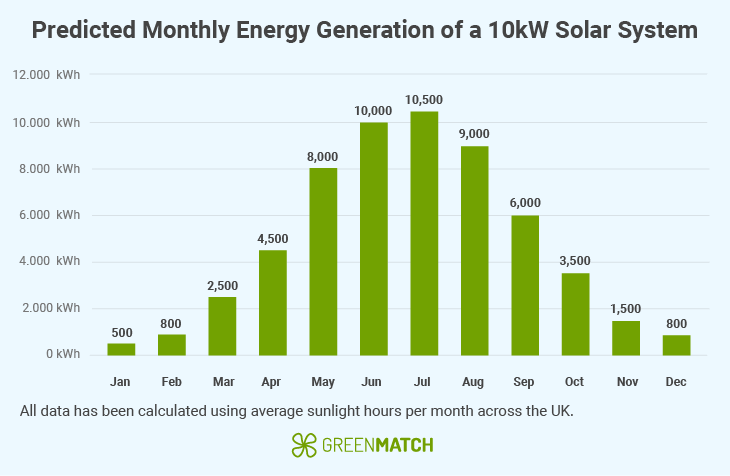
As you may expect, the winter months will generate a lower output, ranging from 500kWh to 800kWh. However, during the summer months, a 10kW system could reach peaks of 10,500kWh.
It’s important to recognise that not all 10kW solar systems will operate at the same level. Factors such as your location in the country, the angle of your roof, and even the material your panels are made of can all impact how much sunlight they receive.
On average, a 10kW system typically produces between 8,000kWh and 15,000kWh per year, which is far more than the national average electricity needs for a large home (between 4,100kWh and 6,700kWh based on Ofgem’s latest typical values). Therefore, a 10kW solar system will produce an ample supply of energy for your property year-on-year.
Is a 10kW solar system with a battery worth it?
Yes! A 10kW solar panel system is a great option for those with larger homes or small businesses. This is due to its ability to produce larger quantities of electricity, between 8,000kWh and 15,000 kWh per year. Properties with 6 or more bedrooms will benefit most from these systems, which can power the entire household.
If you have a smaller home or property, you should consider something less powerful, such as a 5kW solar system intended for 3-4 bedrooms. If you get a system that is too large, you can end up paying much higher costs to install it and the payback period will be much longer.
Determining if a 10kW solar system with a battery is worth it for you, will depend on your circumstances. For instance, you should consider the costs involved in installing solar panels and any return on investment period. Adding a battery to your system can also add a further £6,000 - £12,500 to your costs.
In terms of savings, however, there are many reasons to opt for a 10kW solar system, as you can save over £2,000 per year on your electricity bills. You will also enjoy savings of up to £52,000 after 30 years, meaning over the course of their lifetime, these solar panels can provide ample savings for you to enjoy.
In addition, you can receive SEG payments when you install a solar battery with your solar panels, as any excess energy stored can be sent back to the grid.
To get the best solar panel system for your needs, we recommend speaking to a qualified installer. They can give you the best advice and help you enjoy solar energy to the fullest.
While it can take hours, or even days, to research and verify the credentials of solar professionals, all of the installers within GreenMatch's network have been vetted.
By filling in our simple, 30-second form, you can easily get access to up to 4 solar installers who will offer you tailored quotes for free!
Just click the button below to start getting these free, no-obligation quotes.
- Quotes from local engineers
- Payment by finance available
- Save up to £1,567 per year
It only takes 30 seconds



FAQ
Yes, a 10kW solar system is suitable to meet the energy demands of a large home or small business. Whether a 10kW solar system is suitable for your home depends on your own energy consumption. You may need a smaller or larger-sized solar system.
Yes, installing a 10kW solar system in the UK is possible. However, you’ll need to consider whether a solar panel system is worth it for your home first. Some of the biggest factors to consider are cost, space requirements, installation complexity, and roof suitability.
In a day, a 10kW solar system can produce anywhere between 20 to 44kWh depending on how much sunlight you get. On average, the UK receives 4.4 hours of sunlight a day.
The amount of solar panels depends on the power (measured in watts) of the panel. Typically, for a 10kW solar system, you’d need between 25 (400W panels) and 40 (250W panels).
The number of batteries for any solar system depends on the amount of energy you would like to store. It also depends on the size of the battery as different models can store different amounts.

As a writer with a deep understanding of low-carbon energy systems, Hannah aims to breakdown knowledge barriers and share insights to empower individuals in their pursuit of creating more environmentally conscious homes.

We strive to connect our customers with the right product and supplier. Would you like to be part of GreenMatch?


